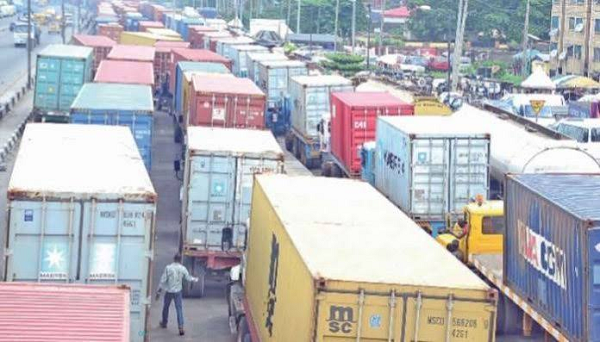NPA’s ‘Eto’: The Good, The Bad, The Ugly
By Kenneth Jukpor & Yusuf Odejobi
The recent announcement of Nigerian Ports Authority (NPA) to start the long awaited electronic truck call-up system “Eto” as a lasting solution to the truck congestion around Apapa ports and its environs, has brought as much reassurances as skepticisms.
After more than ten years of port stakeholders’ appeal for electronic truck call-up system via conferences, protests and letters to the presidency, an electronic system to sanitize the movement of trucks and tankers operating in Lagos ports will take off soon, precisely on February 27th, 2020.
If successful, Eto will see the federal government keep its recent promise that the perennial traffic in Apapa and environs will end within the first quarter of 2021.
Despite the optimisms and widespread publicity about the new digital system, there are numerous unanswered questions which could mar the innovative project. These concerns are arousing fears of many truckers that the system may not yield the desired result.
In a bid to guide NPA, truckers and the entire port industry stakeholders in the voyage into Eto, MMS Plus explores the truths and deceptions. These crucial factors that also happen to be prominent themes in Jonathan Swift’s popular book, ‘Gulliver’s Travels’.
Gulliver’s Travels is an adventure story (in reality, a misadventure story) involving several voyages of Lemuel Gulliver, a ship’s surgeon, who, because of a series of mishaps en route to recognized ports, ends up, on several unknown islands living with people and animals of unusual sizes, behaviors, and philosophies, but after each adventure, is somehow able to return to his home in England where he recovers from these unusual experiences and then sets out again on a new voyage.
As the port industry steadies itself for the voyage into an era of Eto, it will be rewarding to begin with an insight into the root causes of the port access crisis. Some of the core problems include; lack of adequate container holding bays by shipping companies in Nigeria, dilapidated and inadequate port access roads, absence of rail connectivity and paltry barge operations, propensity of truck owners to stay on port corridors while sourcing for jobs, corruption among numerous government agencies that have converted the access routes into cash cows, among others.
In 2015, a study by a private consultant revealed that over 5000 trucks constitute nuisance at the Apapa port and clog the access roads while only about 1,300 trucks are needed at the port.
With the introduction of ‘Eto’ which could be an effective truck call-up system, as well as the automation of port services, the Lagos port community may see a new era where only trucks that have business to do at the ports are allowed to access the port roads.
Nevertheless, the fears by most industry observers including truckers stem from the fact that the majority of the organizations, agencies and individuals who earn humongous sums from the traffic chaos are still in the system and wouldn’t be willing to relinquish their money spinning illicit venture.
In December 2020, the haulage cost of moving containers from the Tin Can Island Port increased from N1.2 million to N1.8 million in a week.
Speaking with MMS Plus last week, the Chairman of Association of Maritime Trucker Owners (AMATO), Chief Remi Ogungbemi expressed his fears that Eto may fall into the hands of manipulators which could make a mockery of the whole exercise.
Chief Ogungbemi posited that despite the genuine reasons for setting up the e-truck call-up system, in the hands of corrupt officials it could become tools for their personal interest, nothing that everything electronic or computer-based is “garbage in, garbage out.”
The AMATO Chairman argued further that the disbanded Navy and Presidential task team shouldn’t be allowed to be part of the new system. “If they’re still within the system they will continue to devour people because they know how to manipulate,” he said.
“What we’re experiencing now is a system where some trucks go in the ports almost every 3 days or every week, meanwhile, there are some others who wouldn’t enter the port for a whole month or even two months.”
While he welcomed the Eto initiative, he stated that there will only be peace in a port atmosphere where there is equity and justice, lamenting that those perpetuating the atrocities have the support in the hierarchy either in the police or other security agencies who aid them at the detriment of other truckers.
“The culprits are people that are very influential. They know how to waggle themselves day and night and their trucks keep moving, while others are lamenting,” he added.
Ogungbemi described ETO as being long overdue; adding that as a pilot programme it might need some adjustments and hiccups may arise when it is fully implemented.
Like the AMATO boss, most port stakeholders believe that in the long run Eto will bring respite to port operations in Lagos, especially the Apapa and Tin Can environs that have become characterized by gruesome gridlocks.
Beyond the optimisms of electronic platforms, neither NPA nor the port economic regulator, Nigerian Shippers’ Council (NSC) has been able to compel shipping companies in the country to provide adequate holding bays for their containers.
Despite several threats, queries and diplomatic meetings, the reality is that a large portion of trucks that cluster the port environment are in voyage to return empty containers back to the seaport terminals.
There will also be a need to explore other modes of transportation to evacuate cargoes from the ports as well as to convey them to the ports. This means railways, inland transportation via barges as well as piping for petroleum products will also have to be developed.
Industry operators have also noted that since the Lagos State Government in December 2020, moved to take over from the Presidential Task Force on Port Decongestion and create a new operational template for the taskforce there hasn’t been significant changes to the trucking system on the port access roads.
Speaking to our correspondent on the port access roads, the President of National Association of Government Approved Freight Forwarders (NAGAFF), Chief Increase Uche lamented that the road infrastructure has remained the same for decades while cargo traffic and port activities grew exponentially.
“This repairs and reconstruction is what we have been clamouring for several years. The volume of the activities at the ports kept increasing but we did nothing until it brought us to a position of standstill as we have seen in Tin Can and Apapa before the Wharf road was rebuilt,” he said.
He lamented that the problems associated with empty containers accessing the ports for evacuation are still prevalent.
Uche opined that an electronic truck call-up isn’t a long-term solution to Lagos ports traffic crisis, adding that the long term strategy will be investments in deep seaports.
His words: “There is a need to unbundle the ports because they have reached the peak and are being stretched further. The current ports in Nigeria are all river ports and I would advise that they be turned into industrial ports. You can no longer dredge the berth areas of these ports further, hence, the need for deep seaports. Apapa and Tin Can Island Port can’t go beyond 13meters draft and the current shipping trend is to have gigantic ships with over 18meters draft.”
“Nigerian ports can’t be competitive because the economies of scale can’t apply. This is the major reason the productivity of the ports dwindle every day, while the port cost keeps increasing. Local shipping cost and freight charges also keep increasing.”
Meanwhile, a chieftain at Nigerian Association of Road Transport Owners (NARTO), Alhaji Inuwa Mohammed, welcomed Eto as it will take care of a lot of issues including eradicating corruption within the port corridors and also stimulating activities of the port operations.
According to him, there have been series of stakeholders meetings and enlightenment on Eto, yet, he longed to see how it will work.
“If you look along the port corridors about 80% of the traffic gridlock is caused by trucks that are moving empty containers into the port. Therefore, the shipping companies should be carried along and they should have functional holding bays, so there wouldn’t be a need for any truck to drive to the port to discharge empties. As soon as you drop any consignment at the designated location by the importer or freight agent, you should take the container back to the shipping company’s holding bay. This is how we would be able to have seamless operations in orderly truck movement on the port access roads,” he said.
NPA’s Eto has the potentials to positively change port operations and the distressed port access roads in Lagos, however, it could also pose disparate qualities likened to ‘the good, the bad and the ugly’ which are the three main characters in the 1996 movie scripted by Ennio Morricone.








